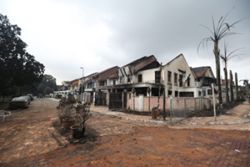
Linne’s two-toed sloth Hope was often curious about her mother’s food. - Mandai Wildlife Group via ST/ANN
SINGAPORE: It was a huge bundle of joy for Mandai Wildlife Reserve in 2024 as it welcomed 998 baby animals across its parks.
The bumper births surpassed 2023’s 970 newborns, which was then the highest number of babies the wildlife parks have collectively produced since 2013.
Among the new additions are 34 species listed as threatened under the International Union for the Conservation of Nature’s Red List of Threatened Species, Mandai Wildlife Group (MWG) said on March 27.
One of them was Putri, a proboscis monkey whose wild populations are declining due to habitat loss from deforestation for timber and oil palm plantations.
Putri, whose name means “princess” in the Malay and Indonesian languages, is the second offspring to parents Malaka and Jeff. She can often be seen playing with her brother Bayu or clinging to her mother at the proboscis monkey habitat.
Of the 143 species that gave birth in 2024, 23 are part of internationally managed breeding programmes such as the European Association of Zoos and Aquaria’s Ex-situ Programme.
The arrival of five slender-tailed meerkat pups – the twins residing at the Great Rift Valley of Ethiopia and the triplets at Wild Africa – marks the first births of the species since 2019, said MWG.
Adding to the list of crowd charmers is a female Linne’s two-toed sloth named Hope and three oriental small-clawed otters.
Another highlight was the arrival of two Goeldi’s monkeys – the first infants in nine years – along with four ring-tailed lemurs and two emperor tamarins.
In the realm of reptiles and amphibians, the endangered golden mantella and black-legged poison frog were among the key breeding successes, said MWG.
“These species require highly specific water conditions for reproduction, and the animal care team achieved a breakthrough by studying and fine-tuning optimal water parameters,” it said, adding that the team also simulated natural seasonal changes, such as adjusting temperatures and humidity, to improve breeding success.
“In a crucial step, eggs were carefully retrieved for assisted hatching, to maximise chances of survival.”
The efforts put in led to a total of 31 golden mantella hatchlings, which was the highest in three years.
According to MWG, another of its key breeding efforts focused on the Chrisangi leaf insect, a
Markhors, with their wide hooves, are perfectly adapted to the rocky, mountainous terrains that they inhabit in the wild.
MWG also welcomed a male woylie, the fifth joey born at Night Safari since 2021, at the Tasmanian Devil Trail.
The joey, which initially stayed close to its mother after birth, is now growing bolder, curiously exploring its habitat and engaging in enrichment activities.
At River Wonders, it welcomed two special additions – a giant anteater pup and a West Indian manatee calf.
Solana, the fifth pup born to Zapata and Iapura, has transitioned to a solid diet of ant eggs and boiled eggs. As she continues to get used to the presence of keepers, the playful young one often climbs onto its mother’s back for comfort.
Meanwhile, the shy West Indian manatee calf at the Amazon Flooded Forest has formed a friendship with a young female born in 2023.
The two can often be seen grazing together. The latest calf, like her buddy, was bottle-fed by the aquarists and tended to round the clock as no nursing behaviour was observed from its mother.
The endangered Lake Titicaca frog was also successfully bred by River Wonders in the same year it was first exhibited.
The blue discus, a tropical fish native to South America, continues to thrive with 80 new members joining the school.
High conservation value species like the golden parakeet and yellow-mantled chattering lory were born in Bird Paradise in 2024.
To ensure their survival, eggs that were neglected or abandoned in the aviaries were safely retrieved and incubated at its breeding and research centre.
According to MWG, newly hatched chicks are placed in a specially controlled environment. The chicks will be hand-raised and gradually exposed to fluctuations in temperature and humidity, preparing them for release to the aviaries.
Other notable baby birds included first-time hatchings for MWG, such as the blue-winged leafbird, Madagascar teal and Meller’s duck as well as the first Nyasa lovebird and green honeycreeper hatchlings in over seven years.
They also celebrated its first-ever penguin hatchlings with two gentoo penguin chicks born to first-time parents Riki and Peach, and one to parents Citrus and Enzo. - The Straits Times/ANN






































